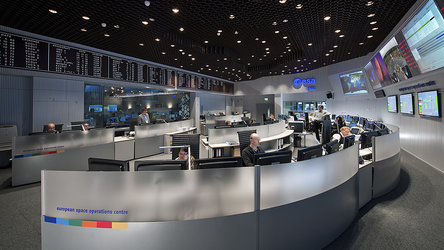UAE Minister of Economy briefed on ESA services
On 8 May, Her Highness Sheikha Lubna Khalid Sultan al Qasimi, Minister for Economy and Planning of the United Arab Emirates (UAE), visited ESA's Space Operations Centre in Darmstadt. Highlight topics included Galileo, Envisat and the operational services ESA makes available to external customers.
The minister was welcomed by Jean-Francois Kaufeler, Deputy Head of the European Space Operations Centre (ESA/ESOC).
Senior managers provided presentations on the European Space Agency, including ESA's organisation and budgets, as well as on Europe's space programmes in the areas of Earth observation, exploration, human spaceflight, launchers and technology transfer.
The guests visited ESA's operations centre as part of a mission to Germany co-organised by the regional government of Hessen, which hosts the ESOC facility. The minister is leading a delegation of some 250 representatives from UAE public organisations and private businesses aiming to boost trade and investment between the two countries at the 3-day UAE-German Economic Partnership Forum, in Frankfurt, Germany.
ESOC external customer services
The visiting group was also briefed on the external customer services provided by ESOC, including satellite launch control, routine mission operation services, third-party ground tracking support and the provision of specialised software and ground segment management services for spacecraft operators.

The presentations were followed by a walking tour of the facility, including the Main Control Room, used for critical LEOP (Launch and Early Orbit Phase) ground control, the Dedicated Control Rooms used for the Envisat and ERS-2 Earth observation missions, the full-scale Rosetta engineering model and the new Navigation Facility, now playing a key role in early validation of technology for Europe's Galileo navigation system.
ESOC: "Europe's Gateway to Space"
As ESA's control centre, ESOC is responsible for the operation of all ESA satellites as well as for the development and maintenance of ground stations and related communication networks.

Since its establishment in September 1967, ESOC has operated more than 55 satellite and has supported numerous missions of other national and international organisations.
Based on its highly developed infrastructure, technologies and specialised teams, ESOC can operate more than 10 satellites simultaneously in routine operations plus additional satellites in the LEOP (launch and early operations) phase.
ESOC has conducted numerous satellite recovery missions and is a focal point for space debris studies and satellite navigation.















 Germany
Germany
 Austria
Austria
 Belgium
Belgium
 Denmark
Denmark
 Spain
Spain
 Estonia
Estonia
 Finland
Finland
 France
France
 Greece
Greece
 Hungary
Hungary
 Ireland
Ireland
 Italy
Italy
 Luxembourg
Luxembourg
 Norway
Norway
 The Netherlands
The Netherlands
 Poland
Poland
 Portugal
Portugal
 Czechia
Czechia
 Romania
Romania
 United Kingdom
United Kingdom
 Slovenia
Slovenia
 Sweden
Sweden
 Switzerland
Switzerland



























